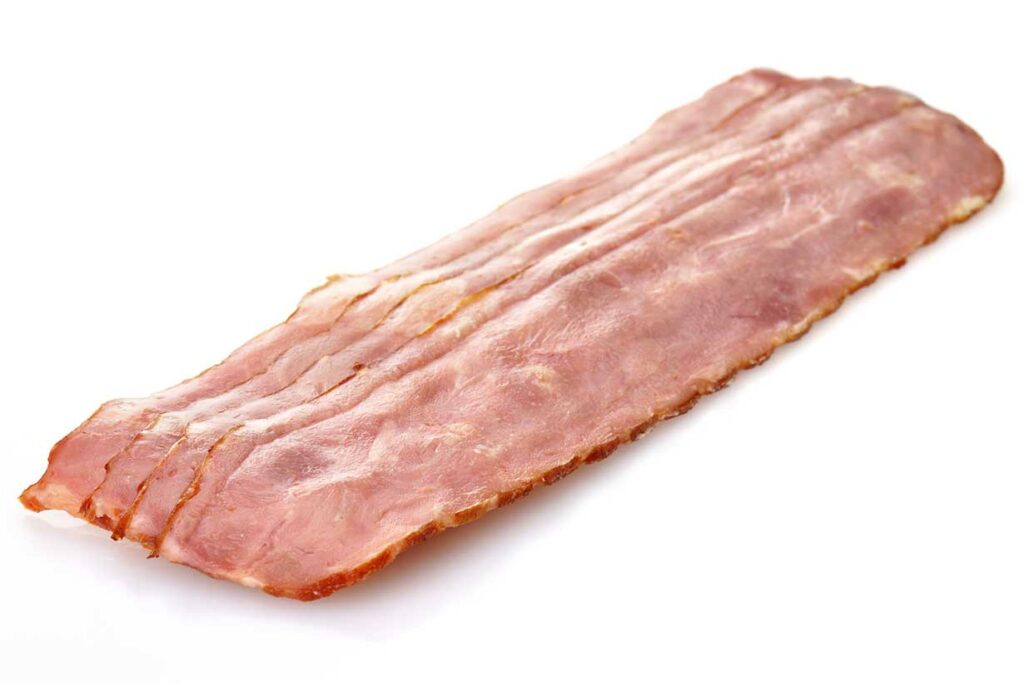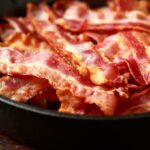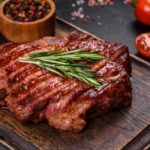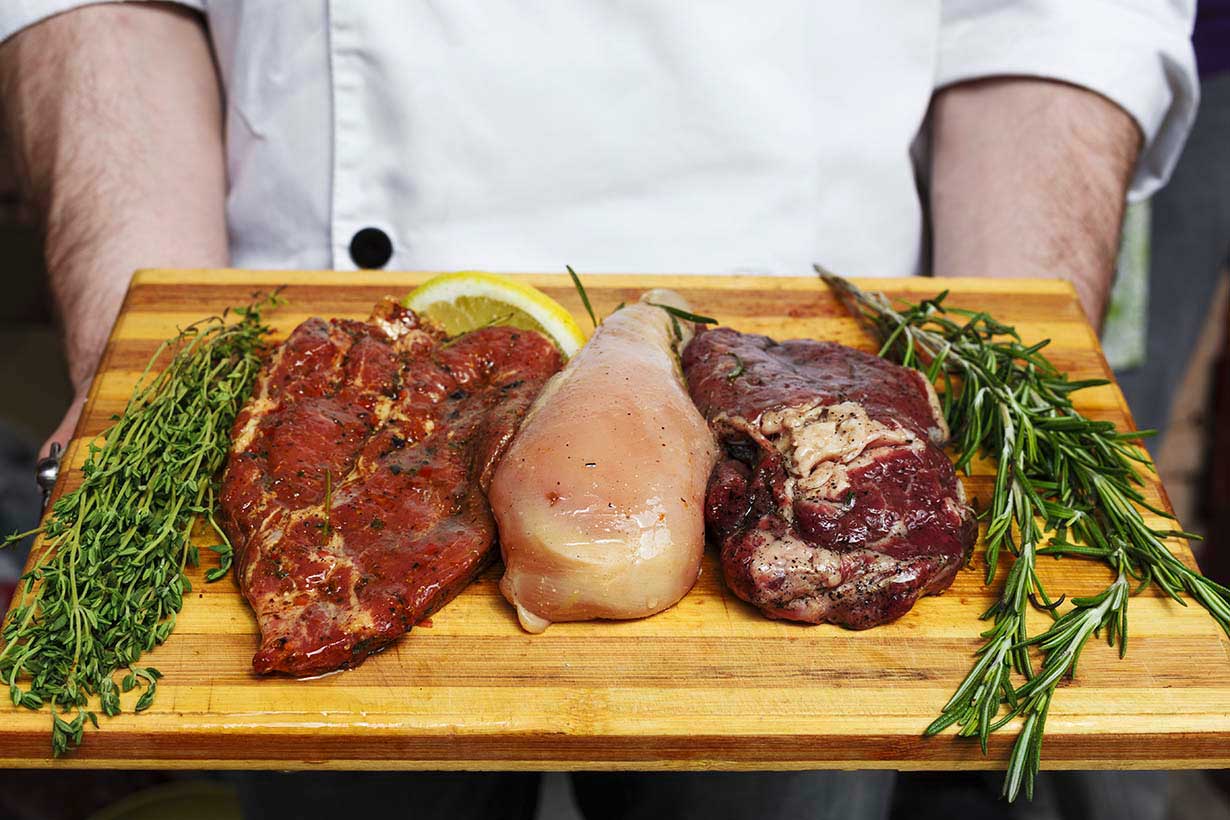Marketed as a lower-fat alternative to regular bacon, people often view turkey bacon as a ‘healthier’ choice.
However, is this accurate?
This article provides a guide to turkey bacon and how it compares to regular (pork) bacon.
Table of contents
What Is Turkey Bacon?

Turkey bacon resembles regular pork bacon; it looks somewhat the same, is smoked and salted, and has a slightly similar taste.
However, it is made from turkey instead of pork. Since turkey is a leaner meat, it has fewer calories.
For this reason, people with specific bodyweight/dieting targets sometimes favor leaner turkey-based products like turkey bacon and turkey sausages.
Turkey bacon sells in packets containing numerous strips in the same way as regular bacon.
What Is Turkey Bacon Made Of?
Firstly, if we look at regular bacon, it comes from a specific cut of pork.
In the United States, that cut is pork belly. However, bacon comes from pork loin/back in Canada, and in the United Kingdom, a cut of bacon includes both pork belly and pork loin.
In contrast, turkey bacon is slightly different as it does not come from any specific cut of meat.
The production of turkey bacon involves grinding dark and light turkey meat and combining them with various other ingredients. After this, the producers press the turkey into strips that resemble bacon and (sometimes) smoke them (1).
The ‘various other ingredients’ include salt, seasonings, and preservatives.
To be more precise, here are the ingredients in the ‘Oscar Mayer brand of turkey bacon made by Oscar Meyer, according to USDA data (2):
- Turkey
- Sugar
- Salt
- Potassium lactate
- Water
- Potassium chloride
- Sodium diacetate
- Sodium phosphates
- Smoke flavor
- Sodium ascorbate
- Autolyzed yeast extract
- Sodium nitrite
- Soy lecithin
It is worth noting that, aside from turkey, sugar, and salt, the remaining ingredients were ‘2% of less’ of the ingredients.
How Does Turkey Bacon Compare To Regular Bacon Nutritionally?
The table below shows the basic nutritional data for turkey bacon, American bacon (pork belly), and Canadian bacon (pork loin). All of this data is courtesy of the USDA FoodData Central database.
Since each type of bacon has a different slice weight, the table presents the nutritional values per 100 grams/3.5oz cooked weight (3, 4, 5).
| Name | Turkey bacon | Bacon (pork belly) | Bacon (pork loin) |
|---|---|---|---|
| Calories | 368 kcal | 548 kcal | 146 kcal |
| Carbohydrates | 4.24g | 1.35g | 1.8g |
| Fiber | 0g | 0g | 0g |
| Sugars | 4.24g | 0g | 1.2g |
| Fat | 25.9g | 43.3g | 2.78g |
| Saturated | 6.93g | 14.2g | 1.04g |
| Monounsaturated | 9.38g | 19.1g | 1.26g |
| Polyunsaturated | 6.87g | 4.86g | 0.49g |
| Omega-3 | 0.39g | 0.21g | 0.02g |
| Omega-6 | 6.93g | 4.29g | 0.43g |
| Protein | 29.50g | 35.73g | 28.31g |
| Sodium | 2020 mg | 2190 mg | 993 mg |
As we can see from this data, turkey bacon contains approximately 33% fewer calories than regular bacon. This difference in calorie provision is primarily due to the lower amounts of fat in turkey bacon.
Per slice, here is how this nutritional data translates (note there is a difference in slice size):
- Turkey bacon slice (11g): 40.5 calories, 0.47g carbohydrates, 2.85g fat, 3.24g protein
- Bacon (pork belly slice – 8.1g): 44.4 calories, 0.11g carbohydrates, 3.51g fat, 2.89g protein
- Bacon (pork loin slice – 23g): 33.6 calories, 0.41g carbohydrates. 0.64g fat, 6.51g protein
To see how more varieties of bacon compare, see this nutritional guide to 12 types of bacon.
Low-Fat Turkey Bacon Is Available
It is also important to note that ‘low-fat’ turkey bacon options exist, and they are much lower in calories and fat than regular turkey bacon.
In some countries, these might be the most prevalent varieties of turkey bacon found on store shelves.
For example, a ‘94% fat-free turkey bacon’ produced by the ‘OUR FAMILY’ brand provides the following nutritional values per 100 grams as sold (6):
- Calories: 143 kcal
- Carbohydrates: 3.57g
- Fiber: 0g
- Sugars: 3.57g
- Fat: 5.36g
- Protein: 21.4g
- Sodium: 714 mg
Is Turkey Bacon a Healthy Choice?
When asking if a particular food is “healthy,” we always need to consider what it might replace in the diet.
For this article, we will presume turkey bacon is a replacement for regular bacon.
There are four areas in which we can compare turkey bacon and regular pork bacon:
- Calorie/fat content
- Sodium content
- Turkey is poultry/white meat, pork is red meat
- Level of processing/nitrate/nitrite
Turkey Bacon Has Fewer Calories and a Lower Fat Content
First of all, there is nothing wrong with consuming higher-fat and higher-calorie foods providing they are part of a sensible overall diet.
However, turkey bacon offers a similar experience to regular bacon for fewer calories for people trying to reduce their energy intake. As a result, turkey bacon may be a helpful choice for individuals with weight targets.
Additionally, turkey bacon has a lower saturated fat content than pork belly bacon, with 6.93g per 100g cooked versus 14.2g (3, 4).
When consumed excessively, saturated fat can cause a substantial rise in low-density lipoprotein cholesterol (LDL-C) levels (7).
The extent of this effect can vary from individual to individual, but across the population, higher LDL-C levels are strongly associated with a higher risk of cardiovascular disease (8, 9).
Therefore, turkey bacon may be better for individuals closely monitoring their saturated fat intake.
Once again, there are also low-fat turkey bacon options. These options will be more beneficial for those trying to consume fewer calories and grams of fat.
Sodium Levels Can Vary
The sodium levels within bacon and turkey bacon can vary from product to product and brand.
However, neither regular bacon nor turkey bacon is ideal for low-sodium diets, and they both have high salt levels.
If monitoring sodium intake, the best thing to do is to check the nutrition label of potential purchases. Checking the label will allow a clear view of how much salt/sodium the different available bacon products contain.
Turkey Bacon Isn’t Red Meat
One argument for turkey bacon potentially being a healthier choice would be that it is a type of poultry.
In contrast, regular bacon (pork) is a form of red meat.
Some people may see turkey bacon as ‘healthier’ because red meat is consistently associated with a higher long-term risk of cardiovascular disease and colorectal cancer. However, turkey (and other forms of poultry) are not (10, 11, 12).
It is important to note that these are associations rather than proof of causality.
That said, some mechanisms may explain why a high intake of red meat is associated with these risks, and these include:
- Red meat is higher in saturated fat, which can increase LDL-C levels to levels associated with higher cardiovascular risk (13)
- A higher dietary intake of heme iron is associated with a higher risk of cardiovascular disease. It is also strongly linked to mutations that play a role in colorectal cancer development. Red meat is the most commonly eaten food high in heme iron, and processed meats also contain nitrate (14, 15, 16).
This topic is complex and requires nuance, though. Furthermore, according to the data, the relative risks for the individual are small.
See this article on red meat’s potential health effects (both positive and negative) for more information.
Turkey Bacon Is Still Processed Meat
The preservatives sodium nitrate and sodium nitrite, commonly referred to as nitrates or nitrites, are common ingredients in bacon.
Again, nitrate and nitrite are other food components that have been associated with colorectal cancer risk (17, 18).
However, turkey bacon contains these preservatives in just the same way as regular bacon does.
A 2021 systematic review and dose-response meta-analysis found that dietary nitrate/nitrite exposure slightly increases colorectal cancer risk. To be more specific, dietary nitrate increased colorectal cancer risk by 13% and dietary nitrite by 7% (19).
In terms of relative risk (for the individual), if 30 out of 1000 people were to develop colorectal cancer, dietary nitrate might be responsible for raising this number (by 13%) to 33.9 people out of 1000.
As we can see from this, the risks are small for each individual but still represent a significant population-level risk.
Full Nutrition Facts
Here is the full nutritional profile for regular turkey bacon, per 100g cooked weight, based on data from the USDA FoodData Central database (3).
All daily values (% DV) have been calculated using the USDA data and the FDA’s published daily values (3, 20).
| Name | Amount | % Daily Value (% DV) |
|---|---|---|
| Calories | 368 kcal | |
| Carbohydrates | 4.24g | 2% DV |
| Fiber | 0g | 0% DV |
| Sugars | 4.24g | |
| Fat | 25.9g | 33% DV |
| Saturated | 6.93g | 35% DV |
| Monounsaturated | 9.38g | |
| Polyunsaturated | 6.87g | |
| Omega-3 | 0.39g | |
| Omega-6 | 6.93g | |
| Protein | 29.50g | 59% DV |
As the table shows, turkey bacon is primarily a source of bacon and fat. Most of the fat content is from saturated and monounsaturated fatty acids.
Vitamins
- Vitamin B12: 78% of the daily value (% DV)
- Niacin (B3): 51% DV
- Riboflavin (B2): 31% DV
- Vitamin B6: 22% DV
- Choline: 16% DV
- Vitamin D: 6% DV
- Folate: 4% DV
- Thiamin (B1): 4% DV
- Vitamin A, RAE: 2% DV
- Vitamin E: 1% DV
- Vitamin C: 0% DV
Minerals
- Sodium: 88% DV
- Selenium: 52% DV
- Zinc: 43% DV
- Phosphorus: 33% DV
- Iron: 15% DV
- Potassium: 14% DV
- Calcium: 13% DV
- Copper: 13% DV
- Magnesium: 7% DV
Final Thoughts
To summarize all the information in this article, here are some reasons to choose turkey bacon and some reasons not to.
Reasons To Choose Turkey Bacon
- For people wishing to decrease food/calorie intake, turkey bacon can offer substantially lower fat and calorie content than regular bacon – particularly low-fat turkey bacon products.
- It offers a bacon-like taste experience for people who like bacon but want to consume fewer calories and less fat.
Reasons Not To Choose Turkey Bacon
- Most people would agree that turkey bacon doesn’t taste as good as the real thing. If people are not actively seeking a lower calorie alternative, then regular bacon is the understandable choice for taste.
- Turkey bacon is still a type of processed meat, and most products will contain sodium nitrate and sodium nitrite. These preservatives are associated with a higher risk of colorectal cancer, so unprocessed turkey would be a healthier choice.
- Similar to all bacon, turkey bacon contains a large amount of salt. This may be an issue for people following low-sodium diets to consider.








